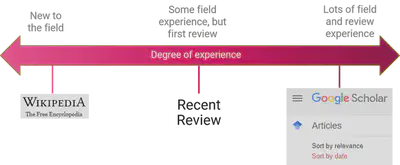Where to Start (and When to Stop) a Lit Review
 Image by Gerd Altmann from Pixabay
Image by Gerd Altmann from Pixabay
When it comes to a literature review for thesis and article writing, everyone has the same three questions.
- Where do I start?
- When do I stop?
- How do I stay organized?
Today, we’ll cover some tips for answering the first two questions. Next week’s post will address organizing sources.
Where do I start the lit review?
The big picture - It’s important to first get a sense of the overall field, and where you’ll begin with this depends on your level of experience in the field. If you are completely new to the field, then beginning with a relevant Wikipedia article may be right for you. Like academic literature, Wikipedia entries have references which can point you to relevant articles in the literature. However, if you’re familiar with the field and haven’t done an in depth literature review in it yet, then reading both a dated (at least 5 to 10 years old) and a recent (in the last 1 to 2 years) review article can help you understand the overall progress of the field and identify important articles and themes. Finally, those with high experience and knowledge in the field may choose to begin by reviewing the most recent publications using Google Scholar or a similar source.

The outline - Before you begin the literature review, you should have developed an outline. Now that you have an understanding of the big picture, re-evaluate the outline for missing pieces, logical flow, and potential redundancies. If things seem overwhelming, pick a topic or subtopic to begin your research at. You could either ease into the process by choosing a topic you know fairly well, or pick the area where you are the weakest and know you will need to spend the most time.
When do I stop reading and start writing?
Set a deadline - Consider allocating a specific amount of time to the initial research stage of your writing process. This may help you be more efficient with your research time and gives a non-negotiable deadline to start putting words to paper.
Keep track - Keep a log or journal where you note the search terms and databases that you have used to find sources. Have you exhausted your options? If so, consider asking a colleague or your advisor if they have additional suggestions for search terms and/or resources. If not, or you feel confident with your search thus far, then it might be time to start your first draft.
Update your outline - The outline should help guide your reading and information gathering, and should be updated as you work through each topic and subtopic. When each section seems to have a reasonable number of points, then you probably have enough information for the first draft.
Check your mental load - Sometimes you will come across a new piece of information or perspective that will shift your thought process. Sometimes there will be so much information in your head that there doesn’t seem to be room for any more. Any time there are thoughts that seem to be swirling, then it’s time to put them to paper. Maybe this means that after spending a few days on a subtopic your brain feels overwhelmed, so you stop and draft a few paragraphs before you move on to the next. Or maybe you’ll research 50% or 90%, or even 100%, of the outline before this happens and you stop for a few days to get all of the information out of your head and onto paper. Either way, figuring out what works for you will give you a better idea of when it’s time to stop reading and start writing.
Don’t stress - Remember that writing is iterative so you can always (and probably will) come back to the research stage later.
Resources
-
The Literature Review | A Complete Step-by-Step Guide - Good tips for review papers